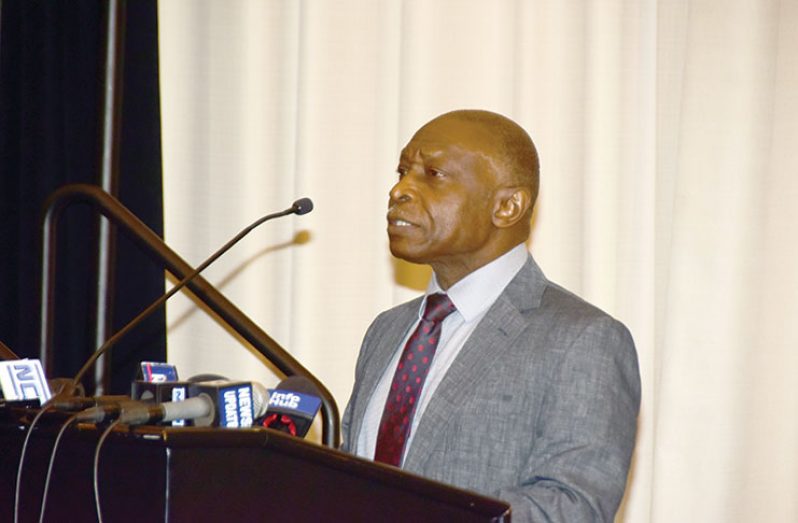— Greenidge says criticisms fail to look at oil contract in its entirety
ACTING President and Minister of Foreign Affairs Carl Greenidge says that there is “little substance” to negative claims being made against the petroleum contract signed between the government and ExxonMobil.
The acting president made the comment as he chastised a media house for working against the preservation of Guyana’s territorial integrity. Coming out of the International Decade for People of African Descent (IDPAD) Summit 2018 held at the Marriott Hotel, Greenidge said news agencies needed to ensure they understood the business of oil and gas before reporting on it.
“I saw, for example, a newspaper report comparing us to Ghana and if a newspaper does not understand the difference between profit-sharing and an arrangement that has a royalty plus normal or near normal profit tax, then it shouldn’t be involved in such discussions,” the foreign affairs minister stated.
He highlighted the contributions of Presidential Adviser on Sustainable Development, Dr Clive Thomas to the oil and gas discussions, stating that Ghana’s oil contract which, for the past few weeks, has been compared to Guyana’s in the media should be looked in its entirety rather than having portions of it picked out.
“I invite you to have a look at his contributions … on petroleum and gas and you will see… that you cannot simply take an agreement fashioned by one country and compare it, mindlessly, to others; take a bit, an element out of one and compare it elsewhere. You have to look at the specifics,” Greenidge said.
He then pointed out that the physical circumstances play a role in the differences between two contracts and that other issues specific to Guyana must be taken into consideration when analysing the agreements.
“Offshore isn’t just offshore. Offshore can mean just offshore (a short distance away) or it can mean deep sea. For example, our oil petroleum reserves are quite far out into deep waters. It requires a lot of investment. There are a lot of risks involved because you may know the oil is there but to get it out is another problem.
“We face special problems. Both of our neighbours have, at various points, used force against those who are trying to help us develop those resources. All of those things have to be taken into account,” said Greenidge.
On that note, he rebuked one media house for the way it has been reporting on Guyana’s emerging oil and gas sector, stating that there are similarities between these reports and that of another state which threatens Guyana’s territory. “Whilst nobody can object to critique, criticism or question, some of this is irresponsible and you could see some of them linked very closely.
One newspaper, in particular, (is) pursuing policies which, if you look at them closely are identical to those that are being put out by one of our neighbours who is very much interested in stopping the work of Exxon offshore,” Greenidge said.
“Now, why should one of our newspapers be carrying a policy along those lines? The petroleum analysis they’re supposed to be carrying out should be no different from the commentaries in relation to our territorial integrity and we have to look at that,” he said
The government has established that it will not renege on the oil contract signed with ExxonMobil while the Cabinet has since approved the establishment of a Department of Energy within the Ministry of the Presidency for the management of the looming petroleum sector.










